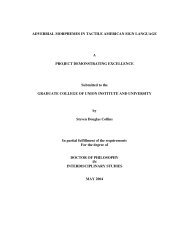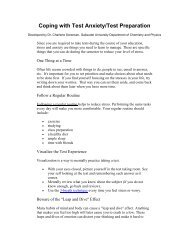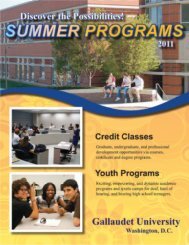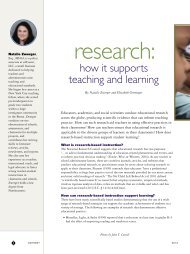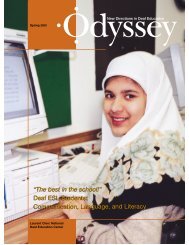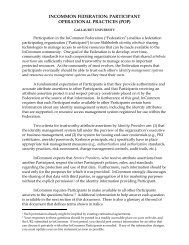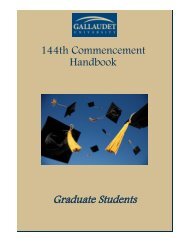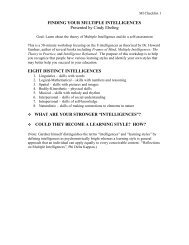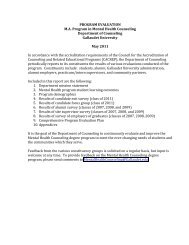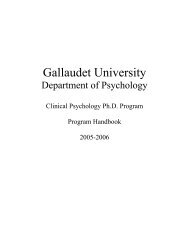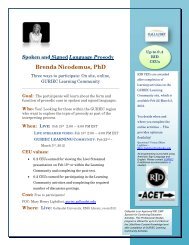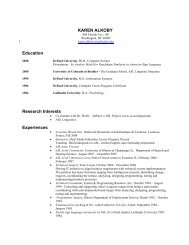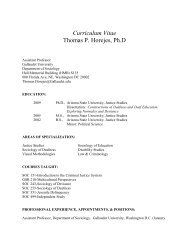practices - Gallaudet University
practices - Gallaudet University
practices - Gallaudet University
You also want an ePaper? Increase the reach of your titles
YUMPU automatically turns print PDFs into web optimized ePapers that Google loves.
Sinnreich noted that the program was instituted at the<br />
suggestion of a KDES parent.<br />
“Donna Venturini, the mother of Megan Venturini, had a son<br />
at another school who was using AR,” said Sinnreich. “She<br />
thought the program would benefit her daughter and other<br />
students at Kendall. She convinced us to take a look at this as a<br />
supplementary program.”<br />
Venturini first shared the program with members of<br />
Parents as Partners, a committee of parents and teachers that<br />
helps shape direction for programming at KDES. Venturini<br />
thought that if the school was willing to incorporate the<br />
program, the Kendall Home School Organization, a parent<br />
organization, could invest by buying books for the program.<br />
At first, Sinnreich confessed, some of the teachers were<br />
skeptical. “But when we saw the excitement the program<br />
generated, we realized it would be good for our school.”<br />
AR and its complementary program, STAR Reading, a<br />
computer-adapted, norm referenced reading test, have proved to<br />
be invaluable educational tools. “By the time a child leaves the<br />
program, you have a complete record of almost every book that<br />
child has read,” said Sinnreich.<br />
But it is the response of the students that has the teachers<br />
excited.<br />
“I see the students read during lunch and even during<br />
classes,” said lead teacher Maureen Yates Burns. “When I told<br />
one student to stop reading and pay attention, he said he<br />
wanted to finish reading so he could take the test.”<br />
Imagine that.<br />
Working with Parents is Key to KDES Success<br />
“When a school works together with parents, the students<br />
will benefit,” said Leslie Page, family education coordinator for<br />
the Laurent Clerc National Deaf Education Center. “The<br />
Accelerated Reading (AR) program shows what can happen<br />
when we work effectively with parents.”<br />
When a parent brought AR to the attention of Parents as<br />
Partners, committee members thought that it would be a good<br />
program, said Page. “The strong endorsement of AR from a<br />
parent initially encouraged us to take a look,” she added.<br />
David Schleper, Clerc Center literacy coordinator,<br />
investigated and supported the program. KDES teacher Yetti<br />
Sinnreich coordinated and implemented the program initially<br />
with a small number of students. “We decided that this was a<br />
program that would support our literacy efforts,” said Page.<br />
The AR implementation is another example of active KDES<br />
parents, she added. Parents are involved in a myriad of KDES<br />
events—including Back to School Night, Spirit Week, and the<br />
annual baseball game and barbeque. All events are planned<br />
collaboratively, Page said, with parents, teachers, and staff<br />
working together to develop programs that meet the needs of<br />
families.<br />
Parents as Partners, a committee of parents, teachers, and<br />
staff, works in partnership with the Kendall Home School<br />
Organization and teachers and professional staff. Together they<br />
tackle ideas and logistics to educate deaf children at home and<br />
in the classroom.<br />
“The more involved our parents are, the better off our<br />
students will be,” Page maintained. “We strongly believe that<br />
we need to find out what parents are interested in, and what<br />
they want to learn more about.”<br />
Many parents are concerned about literacy. They want to<br />
learn more about how deaf children’s literacy develops and<br />
what teachers do to promote it. The Parents as Partners team<br />
has created activities that help parents learn about literacy<br />
development and what teachers do to meet this need.<br />
“We developed a panel in which teachers, parents, and the<br />
literacy coordinator discussed questions. We followed this<br />
with a literacy fair, which provided an opportunity to showcase<br />
student work,” Page said. “The first step in investigating AR<br />
was paying attention to parents and their concerns. At the<br />
Clerc Center, working with parents is key.”<br />
WINTER 2002 ODYSSEY<br />
19



